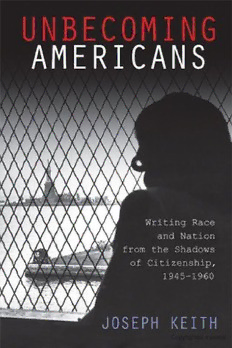
Unbecoming Americans: Writing Race and Nation from the Shadows of Citizenship, 1945–1960 PDF
Preview Unbecoming Americans: Writing Race and Nation from the Shadows of Citizenship, 1945–1960
Unbecoming Americans Unbecoming Americans Writing Race and Nation from the Shadows of Citizenship, 1945–1960 joseph keith Rutgers University Press new brunswick, new jersey, and london library of congress cataloging-in-publication data Keith, Joseph. Unbecoming Americans : writing race and nation from the shadows of citizenship, 1945–1960 / Joseph Keith. p. cm. Includes bibliographical references and index. ISBN 978-0-8135-5967-4 (hardcover : alk. paper) ISBN 978-0-8135-5966-7 (pbk. : alk. paper) ISBN 978-0-8135-5968-1 (e-book) 1. American literature—Minority authors—History and criticism. 2. Immigrants’ writings, American—History and criticism. 3. Citizenship in literature. 4. Race in literature. 5. American literature—20th century—History and criticism. I. Title. PS153.M56K44 2013 810.9'920693—dc23 2012012095 A British Cataloging-in-Publication record for this book is available from the British Library. Copyright © 2013 by Joseph Keith All rights reserved No part of this book may be reproduced or utilized in any form or by any means, electronic or mechanical, or by any information storage and retrieval system, without written permission from the publisher. Please contact Rutgers University Press, 106 Somerset Street, New Brunswick, NJ 08901. The only exception to this prohibition is “fair use” as defined by U.S. copyright law. Visit our website: http://rutgerspress.rutgers.edu Manufactured in the United States of America A book in the American Literatures Initiative (ALI), a collaborative publishing project of NYU Press, Fordham University Press, Rutgers University Press, Temple University Press, and the University of Virginia Press. The Initiative is supported by The Andrew W. Mellon Foundation. For more information, please visit www.americanliteratures.org. For my parents, Christopher and Margaret Keith Contents Acknowledgments ix Introduction: Shadow Narratives of the Transnational 1 part i Novel Forms: Writing at the Limits of Citizenship 1 Neither Citizen nor Alien: Rewriting the Immigrant Bildungsroman across the Borders of Empire in Carlos Bulosan’s America Is in the Heart 27 2 The Epistemology of Unbelonging: Richard Wright’s The Outsider and the Politics of Secrecy 66 part ii Peripheral Forms: Literatures of Alienage, Incarceration, and Deportation 3 Richard Wright’s Cosmopolitan Exile: Race, Decolonization, and the Dialogics of Modernity 107 4 The Undesirable Alien and the Politics of Form: Telling Untold Tales in C. L. R. James’s Mariners, Renegades, and Castaways 131 5 Talking Back to the State: Claudia Jones’s Radical Forms of Alienage 163 Conclusion: An Empire of Alienage 197 Notes 205 Index 229 Acknowledgments It is a pleasure to write these acknowledgments, not only because they mark the end of a longer than expected road that this book took me down, but also to recognize the many friends, colleagues, and mentors without whose support and guidance it would have never been possible. Unbecoming Americans first took shape as a dissertation at Columbia University under the guidance of a number of wonderful advisors. I owe special thanks to Ann Douglas for her unflagging encouragement and direction, which carried me throughout graduate school. Gayatri Spi- vak taught me and challenged me in so many ways; she has also been the source of incredibly generous support over the years, for which I am deeply indebted. Throughout that time and beyond, I have benefited so much from the guidance and personal, as well as professional, example of Rob Nixon. I’d also like to acknowledge Edward Said. I consider myself so fortunate to have been able to consider him as my teacher and mentor. It was reading his work that led me initially to pursue this path, and it is certainly his work, and his classes, and his advice that most inspired this project. I owe a special thanks to a group of friends and colleagues over the past several years that has helped keep me—relatively—sane and whose input made this book better and sharper in every way: Hiram Perez, Sarita See, and Donette Francis. Hiram suffered through countless ver- sions of this book during our very small writing group and provided me with his particular brilliance. Sarita gave me crucial advice at every junc- ture and talked me off any number of cliffs during this book’s writing.
